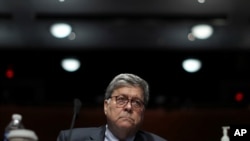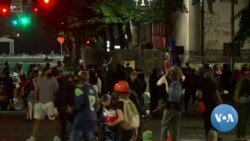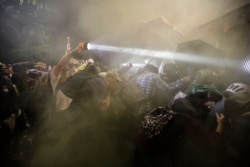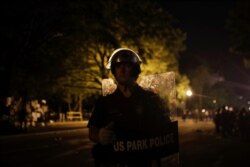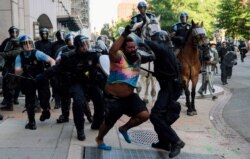U.S. Attorney General William Barr staunchly defended sending hundreds of federal agents to Portland, Oregon, and elsewhere to quell violent protests, while opposition Democrats accused him of violating the civil rights of peaceful protesters.
This was Barr’s first appearance as attorney general before the Democratic-controlled House Judiciary Committee, where the Democrats accused him of taking such actions in Portland to support President Donald Trump’s re-election bid in November.
Barr testified for more than five hours in a tension-filled hearing room where Democrats were clearly angry and Republicans were upset that Barr was interrupted when he tried to answer some of the questions.
Barr said the death in late May of George Floyd, a Black man, while in the custody of police officers in Minneapolis was a “horrible” event that sparked a necessary examination of the relationship between law enforcement and African Americans in the United States.
But he said ongoing protests in Portland and elsewhere have become disconnected from Floyd’s death.
“Largely absent from these scenes of destruction are even superficial attempts by the rioters to connect their actions to George Floyd’s death or any legitimate call for reform,” Barr said.
The committee chairman, Democrat Jerrold Nadler, scolded Barr for “projecting fear” throughout the country by dispatching troops to Portland over the opposition of state and local officials.
“Shame on you, Mr. Barr,” Nadler said to the country’s top law enforcement official.
Barr responded, “In Portland, the courthouse is under attack.” He added, “We are at the courthouse protecting the courthouse” against attempts by protesters trying to set it afire. “We’re not looking to create trouble.”
“If the state would come to protect the site, we wouldn’t need to be there,” Barr said
In his opening statement, Nadler said, “We see the full force of the federal government brought to bear against citizens demonstrating for the advancement of their own civil rights. There is no precedent for the Department of Justice actively seeking out conflict with American citizens, under such flimsy pretext, or for such petty purposes.”
He accused Barr of aiding and abetting “the worst failings of this president,” by adopting “a dangerously expansive view of executive power.”
Republican Jim Jordan of Ohio showed a lengthy video of recent violent unrest in the U.S. after a montage of Democratic officials, including Trump’s November opponent, former Vice President Joe Biden, called them “peaceful protests.”
Separately, several Democrats on the panel accused Barr of doing the president’s bidding by moving to cut the recommendation for a seven-to-nine-year political corruption prison sentence for longtime Trump friend Roger Stone within hours of Trump voicing his opposition to the length of the sentence.
Barr said the recommended sentence for the 67-year-old Stone was too long. Stone was eventually sentenced to a 40-month term, but Trump commuted it days before Stone was scheduled to report to prison.
Republican lawmakers defended Barr, with Louie Gohmert of Texas telling him, “I’m sorry for the abuse you’ve taken.”
In defending the use of federal agents to quell the nightly protests in Portland, Barr told the panel, “As elected officials of the federal government, every member of this committee – regardless of your political views or your feelings about the Trump administration - should condemn violence against federal officers and destruction of federal property.”
He added, “So should state and local leaders who have a responsibility to keep their communities safe. To tacitly condone destruction and anarchy is to abandon the basic rule-of-law principles that should unite us, even in a politically divisive time.”
Portland protests
Protesters and federal forces have clashed in Portland, with the situation there escalating in the days after accusations that federal officers were hauling people away from the demonstration area without probable cause. Federal officials have defended the deployments as necessary to defend federal property.
Portland Mayor Ted Wheeler shared a letter Monday from a group of U.S. mayors asking Congress to act to restrain the use of federal forces, saying, “The actions taken in recent weeks have no place in this nation.”
“We demand that federal troops be removed from our cities and encourage Congress’ continued vigilance and action to pass legislation in both chambers to end this dangerous overreach,” Wheeler tweeted. “This Administration has shown no hesitation or remorse in playing the most toxic and damaging form of politics with the lives and livelihoods of the American people. We say no more. We say unequivocally Black Lives Matter.”
Wheeler was part of a crowd that was tear-gassed during one recent protest outside the federal courthouse in Oregon’s largest city.
Democrats also questioned Barr about other major issues, including voting by mail, the census, and whether the Trump administration is looking to scrap Obamacare in the middle of the coronavirus outbreak.
At another congressional hearing Tuesday, lawmakers reviewed the June 1 federal response to the largely peaceful demonstration in Lafayette Square, across the street from the White House, in which local police and federal agents drove protesters from the park with smoke bombs and pepper balls. Removal of the protesters came shortly before Trump, accompanied by Barr and others, walked to a nearby church to pose in front of cameras as he held aloft a Bible.
Adam DeMarco, a major in the District of Columbia National Guard, said in his prepared remarks that what he witnessed at the site was “deeply disturbing” to both him and fellow National Guard members.
“Having served in a combat zone, and understanding how to assess threat environments, at no time did I feel threatened by the protesters or assess them to be violent,” DeMarco said. “In addition, considering the principles of proportionality of force and the fundamental strategy of graduated responses specific to civil disturbance operations, it was my observation that the use of force against demonstrators in the clearing operation was an unnecessary escalation of the use of force.”
DeMarco further that said the protesters were fellow Americans peacefully expressing their rights and were subject to “an unprovoked escalation and excessive use of force.”
Park police perspective
Acting U.S. Park Police Chief Gregory Monahan offered a different perspective of the events, saying in his prepared testimony that during demonstrations at the park from May 29 to June 1, protesters threw “bricks, rocks, caustic liquids, water bottles, lit flares, fireworks” and hurled pieces of wood at law enforcement officers.
“The unprecedented and sustained nature of the violence and destruction associated with some of the activities in Lafayette Park and surrounding park areas immediate and adjacent to the White House required de-escalation,” Monahan testified. “On the whole, the United States Park Police acted with tremendous restraint in the face of severe violence from a large group of bad actors who caused 50 of my officers to seek medical attention. Our actions as an agency on June 1 centered around public safety and the safety of my officers.”




